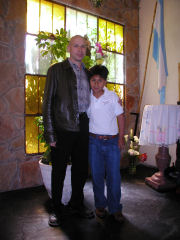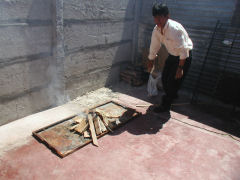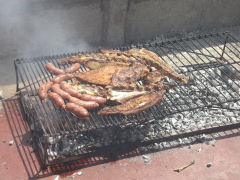Gorina-Hernández, Argentina – I was made an offer I couldn’t refuse. It involved several weeks of discussion, so it wasn’t spur of the moment with a gun pointed at my head. Henry’s sister, Sylvia, asked me to be the padrino, or godfather, to her son Branco at his confirmation. It’s a little different than being a regular godfather I gather, as it relates specifically to his confirmation. I wasn’t, and I’m still not, entirely clear what the purpose of this ritual is, but, in the end, not offending my newly adopted family seemed most important. I made it clear up front that I’m not a confirmed catholic, in fact, other than touristy visits, I’ve never set foot inside a catholic church. I also wasn’t about to renounce my own religion, swear new allegiances, or do the whole wafer and wine bit. It required a bit of discussion over religious differences, but in the end, Sylvia and Miguel decided that having me officially in the family was more important, and that the ultimate intentions of both our religions were basically the same, the differences were in the processes, rituals, etc. (They did ask that I not make some sort of public announcement in the church about being jewish, but I didn’t forsee that as much of an issue, unless…)
 I approached yesterday with significant trepidation. I had visions of being called to the front with the other padrinos-to-be to affirm my belief in the messiah or some such and having to refuse in front of the whole family and congregation. But, it turned out fine. I was merely asked before the ceremony for my name, and during the ceremony only two things were asked of me – one, that I’d promise to make sure that Branco, my new godson, would be raised to be a good person, and that I would support his parents in their raising him as a good catholic, which is just fine with me; and two, to escort him to the front of the room where the priest asked him if he agreed to be confirmed and then blessed him. Then there was lots of family picture taking, followed by heading out to the family home for an asado, or what we might call a backyard barbecue.
I approached yesterday with significant trepidation. I had visions of being called to the front with the other padrinos-to-be to affirm my belief in the messiah or some such and having to refuse in front of the whole family and congregation. But, it turned out fine. I was merely asked before the ceremony for my name, and during the ceremony only two things were asked of me – one, that I’d promise to make sure that Branco, my new godson, would be raised to be a good person, and that I would support his parents in their raising him as a good catholic, which is just fine with me; and two, to escort him to the front of the room where the priest asked him if he agreed to be confirmed and then blessed him. Then there was lots of family picture taking, followed by heading out to the family home for an asado, or what we might call a backyard barbecue.
Sylvia and Miguel, and their two kids, Viviana and Branco, live in one of those shantytowns I’ve mentioned here and there. In fact, the cab driver didn’t seem too keen on taking us there, especially early in the morning (we had to head out there a little after 8 a.m., after a Saturday birthday party at another friend’s house that dragged on until the wee hours – another story, not worth delving into). But we got there, and I got to see the up close and personal view of life at pretty close to the poverty level. They’re definitely not destitute, they just work a lot to end up living decently. And it is a decent sort of living, if not what I’d choose for myself. They have a home, they own the land underneath it, they’re just packed into rows of small concrete and tin dwellings on a maze of dirt roads, out in the sticks. The home itself is probably about a 900 square foot concrete block one-story dwelling divided up into a space that they’d setup as dining room, with a long table and benches; a living room that is used to run her seamstress business out of (she and several other local women contract out their services to a local jeans/casual wear manufacturer and literally process hundreds of pairs of pants and shirts daily); a large kitchen, a bedroom, and a small bathroom. There’s a backyard that includes a second bathroom (fully enclosed), a bathtub (not), a wooden cabaña that they rent out to someone else, and a decent sized patio. Other than four people sharing the space, it’s really pretty comfortable and they’ve furnished it and decorated it nicely.
My new “co-papa” has laid out a pretty decent sized parrilla, or grill, on the patio, and busied himself with building the fire. They’d really outdone themselves, but then, this was a truly special family occasion. It wasn’t a big group, just the four of them, the two of us, and a cousin and his wife. A couple of aunts poked their heads in now and again to make sure that all was well, but didn’t join us for the feast. And feast it was. Not only the big asado, with steak, ribs, chorizo and morcilla sausages; but a green salad, a beet and carrot salad, mounds of potatoes with spicy cream sauce (they were shocked, but thrilled, to find out that I love things spicy, and promptly added more chilies to the sauce, they’d originally kept it mild in deference to the assumption of my delicate north american palate), and bottles of beer, wine, coca cola and pepsi (they keep both in the house, pepsi is apparently for “special” company), and “lemonade” (I think it was lemon flavored Tang). We talked and ate for at least two hours, we hung out, Sylvia had a couple of gifts for me, some pairs of pants and a shirt she’d sewn – really quite nice linen pants for the summer – and she’d gotten my size pretty much dead on just from meeting me a couple of times in the past! We headed back home, stuffed to the gills and happy.


[…] In the two “violent” incidents here in the capitol it was much more targetted. A few protestors broke away from the march and rally and threw molotov cocktails at a couple of fast food outlets and smashed windows and furniture in a Bank Boston branch. Though they were targetting what they perceive as U.S. imperialism, the problem is, these businesses are here, and successful, because locals want them to be. And once again, all they did really is put more locals out of work. Despite whatever mouthings of distaste that I hear from Argentines about fast food outlets, foreign banks, and chain stores like Wal-Mart and Carrefour, they’re the ones shopping in those places. Trust me, you walk into the local Wal-Mart, the aisles aren’t filled with U.S. citizens trying to find goods from back home, they’re filled with locals trying to get “American” goods at a bargain price. The teens hanging out eating burgers at McDonald’s and Burger King aren’t backpackers from Indianapolis, they’re locals spending their parents’ hard-earned pesos on “a real American hamburger.” Every Argentine I know who has any amount of money stashes it in one of those foreign banks, often in an overseas branch. The first thing I heard the other day when I became a padrino was “how do we send our kids to America to be educated?” And despite the occasional complaints I hear about all the U.S. and British ex-pats moving here and buying up homes, nobody’s turning down the influx of currency and investment when it comes time for their share. […]